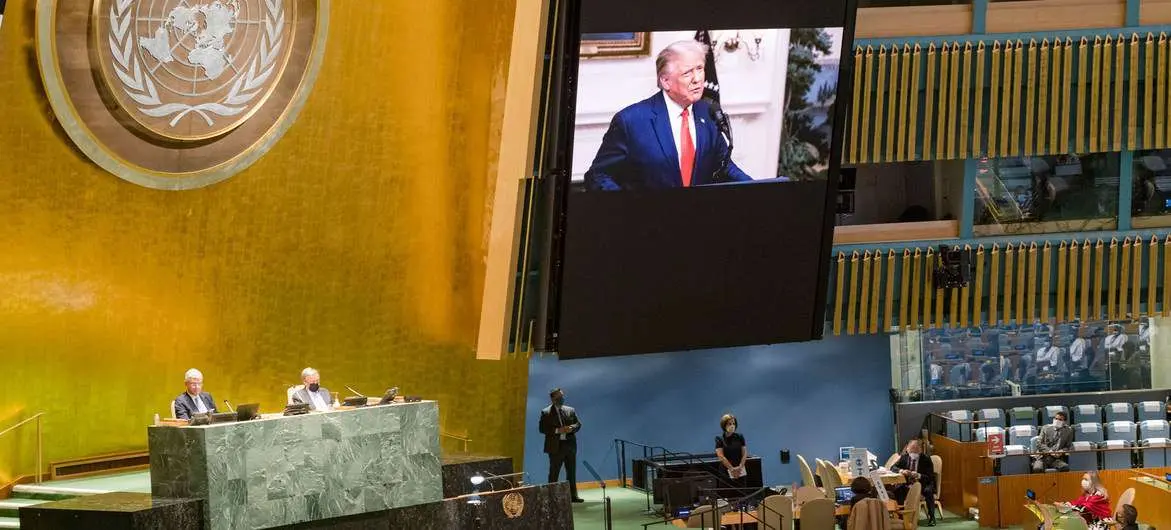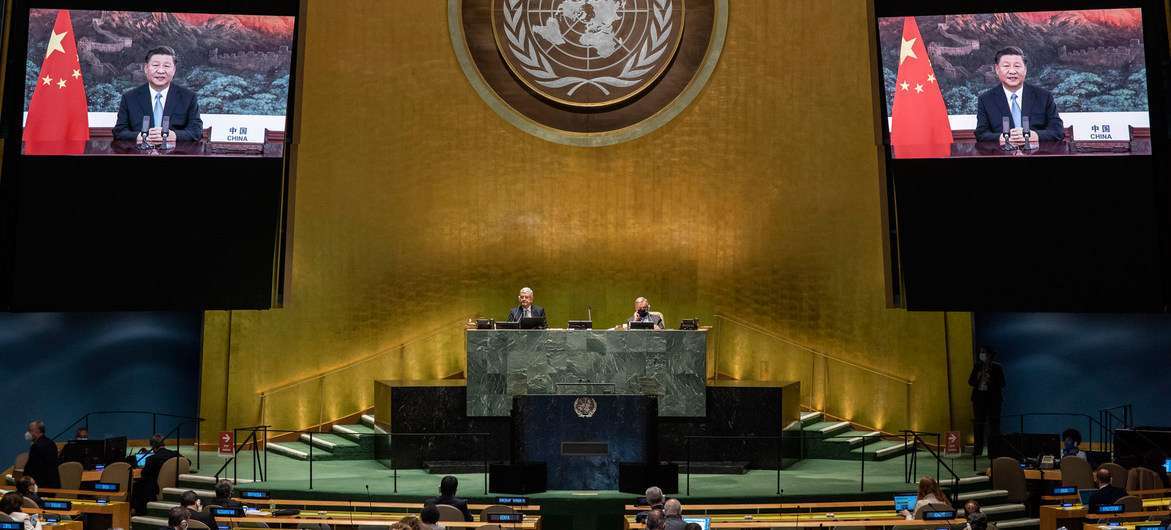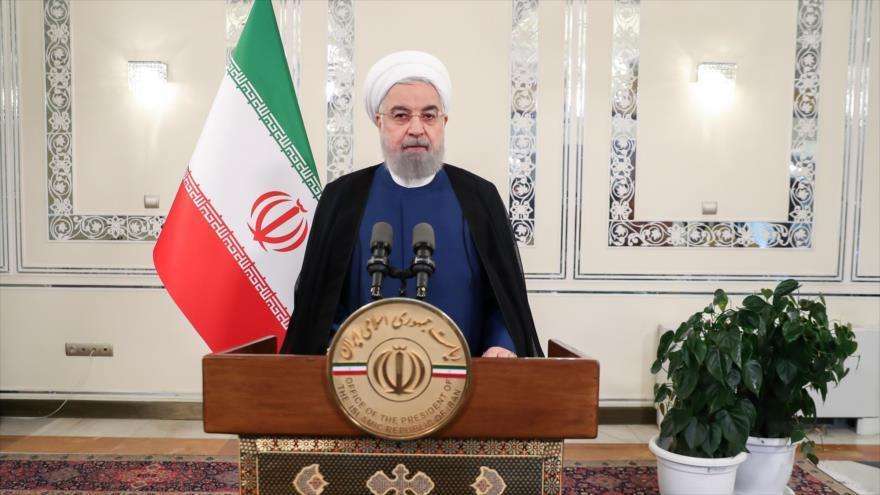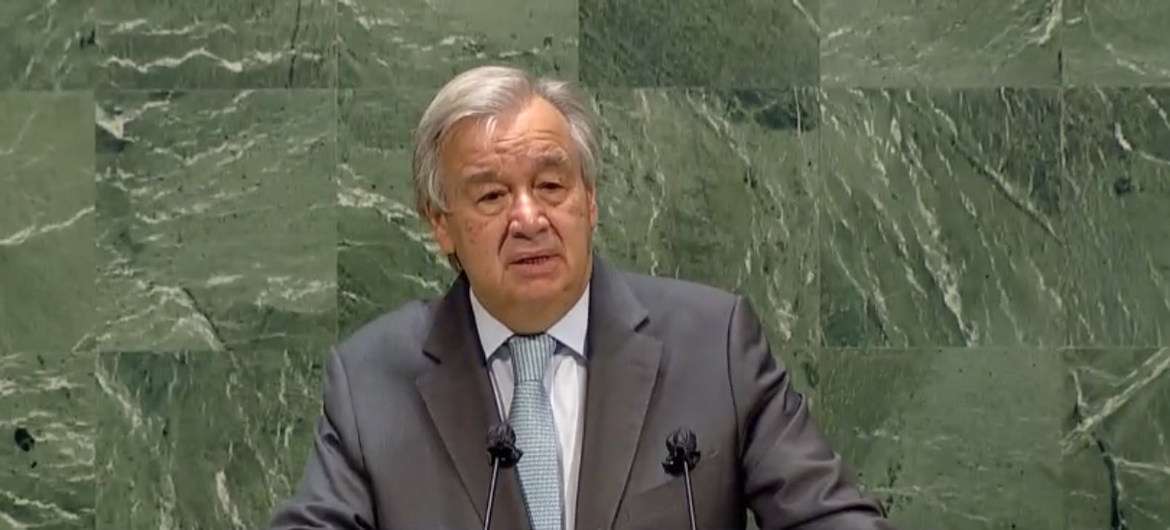United States and China clash at the UN General Assembly

Donald Trump holds China responsible for the pandemic, high carbon emissions and trade abuses. He also highlights the power of its weaponry and says he asks God not to use it. The U.S. president addressed the United Nations General Assembly to ensure that China is responsible for the COVID-19 pandemic and other problems affecting the world and to proudly endorse its nationalist policies and invite world leaders to follow the same model.
"As President, I have rejected the failed approaches of the past and proudly put the United States first, just as you should put your countries first. That's right, that's what you should do," Donald Trump said in a video message recorded at the White House.
The president noted that the world is engaged in a fierce battle with an invisible enemy, which he referred to as "the Chinese virus," that has claimed countless lives in 188 countries, and indicated that the United States has responded with the most aggressive mobilization since World War II to produce ventilators and pioneer life-saving treatments, reducing the rate of deaths from COVID-19 in his country by 85% from April to date.
He also highlighted the three vaccine projects already in the final phase of clinical trials and said they are already producing them for distribution as soon as they are ready.
"We will distribute a vaccine, beat the virus, end the pandemic and enter a new era of unprecedented prosperity, cooperation and peace," he said.
Trump said that although he has withdrawn from the Paris Agreement, his country has reduced its carbon emissions more than any of those that are part of that commitment and accused China of polluting and not caring for the environment.
He also asserted that China commits abuses in the commercial arena and praised the U.S. exit from the nuclear agreement with Iran, a country he called "the leading state sponsor of terrorism.
Speaking about the work of the UN, he considered that to be efficient, the organization must focus on the real problems of the world such as terrorism, oppression of women, forced labor, drug trafficking, sexual slavery, religious persecution and ethnic cleansing.
On the other hand, he boasted of the military power of the United States, which has devoted $2.5 billion in the last four years to this area.
Trump highlighted the agreements that his government has facilitated between Israel and the Arab Emirates and Bahrain, assuring that they mark a new dawn in the Middle East.
He stated that it is his intention to achieve more peace agreements in the near future. "I have never been so optimistic about the future of the region," he stressed.
He also cited the talks with the Taliban to end the war in Afghanistan. "The United States responds to its destiny as a mediator for peace," he said.
"But it is a peace through force. We are stronger than ever, our weapons are more advanced than ever, as we never thought they would be, I just pray to God that we never have to use them," the U.S. president stressed at the end of his speech for the 75th session of the General Assembly.

Xi Jinping affirms that humanity will defeat the coronavirus and supports WHO's leadership in the battle against COVID-19. He also rejects unfounded accusations against his country and maintains that he seeks neither to lead the world nor to wage "a hot or cold war" with any country. "The world needs solidarity, not confrontation," he says.
"Right now the world needs solidarity, trust and cooperation, not confrontation, not the spread of political viruses. China categorically rejects the baseless accusations against it," said China's ambassador to the UN, Zhang Jun, in presenting its president to the General Assembly, responding to the speech made by US President Donald Trump shortly before.
In his speech to the UN's deliberative body, Chinese President Xi Jinping called for "refuting any attempt to politicize" the COVID-19 pandemic or create a "stigma" around it.
Despite the devastation caused by the emergence of the coronavirus, Xi showed optimism based on the efforts made so far by governments, the dedication of health workers, scientific research, and the perseverance of the population,
"People from different countries have come together. With the courage, determination and compassion that illuminate a dark moment, we have confronted disaster with our faces held high. The virus will be defeated. Humanity will win this battle," he said.
Xi called on the world to mobilize all necessary resources to respond with science-based plans and asked that no patient be left untreated.
He also called for increased solidarity, support for the leadership of the World Health Organization, and a joint international response to the crisis.
The Chinese leader said this response must address the needs of developing countries, especially those in Africa.
"The international community needs to take timely and robust action in areas such as debt relief and increased international assistance, ensure the implementation of Agenda 2030 for sustainable development, and help these countries overcome their difficulties," he stressed.
The head of state mentioned the three vaccines developed by his country that are in the third phase of clinical trials and affirmed that when they are ready they will be a "global public good" and that they will be provided to developing countries prioritizing the needs of each nation.
Russia's President Vladimir Putin took to heart Tuesday at the UN over the rapid development in his country of a vaccine against the coronavirus and offered it free of charge to the organization to protect all its employees.
In his video message to the General Assembly, Putin said his government is ready to offer the UN all necessary assistance, including free vaccination for all staff who wish to do so.
He also said his country is open to providing other nations with the so-called "Sputnik V," which he noted has proven "safe" and "effective.
Putin insisted that citizens around the world should have free access to a vaccine against COVID-19 and also stressed the Kremlin's willingness to work with other governments to share methods of diagnosing and treating the disease.
In addition, in contrast to the United States, he argued that the World Health Organization (WHO) should have a central role in coordinating the response and said that Russia is working to strengthen the capacity of the Geneva-based entity.
On the other hand, Putin warned of the long-term economic effects of the current crisis and advocated the need for the entire international community to work together to boost growth.
In this context, he stressed the importance of eliminating barriers, restrictions and, above all, "illegitimate sanctions" in international trade.
On the geopolitical and military front, the Russian leader said he wants to cooperate with the United States in extending the strategic arms reduction treaty and hoped for "restraint" in the deployment of new missile systems.
He also reiterated his interest in a binding treaty to ban weapons in outer space and called for more cooperation on cybersecurity.
Coinciding with the 75th anniversary of the UN, Putin defended the work of the organization and, while acknowledging the need to adapt it to the reality of the twenty-first century, he made clear that his country opposes major changes in the Security Council, where it is one of the five permanent members and enjoys veto power.
He said that if the Council is to remain the "pillar of global governance," it is essential that these five countries, nuclear powers and victors of World War II, retain the privilege of the veto.
French President Emmanuel Macron asked the UN on Tuesday to build "a new order" in the world that is not defined by the "rivalry" between the US and China, and warned that the Europeans "will not give in" to Washington's attempt to restore international sanctions on Iran.
In a long virtual speech before the UN General Assembly, Macron argued that the coronavirus pandemic "should act like an electric shock, like something that forces people to wake up and save lives" and to rethink a global drift that was already tending towards nationalism and that has "accelerated" with the new crisis.
"The world today cannot be reduced to the rivalry between China and the United States, no matter how much global weight those two powers have," said Macron, who spoke for more than 40 minutes.
The French president delivered that message shortly after his US counterparts, Donald Trump and China, Xi Jinping, also addressed the General Assembly and engaged in mutual accusations about the COVID-19 crisis.
"We must build a new order, and that means that Europe has to fully assume its responsibility," not just being "the disappointed spectators of a collective impotence," but committed to "using its margins of maneuver," he stressed.
The French leader urged that the bases of a new globalization be conceived, "more just, more balanced, more equitable and more durable," which integrates the fight against inequalities of all kinds and against global warming.
He promised to make proposals in this direction soon, and advanced that "Africa will be, with Europe, the engine of this redefinition of the terms of globalization.
Macron also referred to the current tensions in the UN Security Council, where the United States -after failing in its attempt to extend the arms embargo against Iran- has invoked a clause in the nuclear agreement to call for the reinstatement of all international sanctions lifted with the approval of the pact.
"France, with its German and British allies, will maintain its demand to fully implement the 2015 agreement (...), and will not give in to the activation of a mechanism that the US, upon leaving the agreement, is not in a position to activate," he warned.
The President also reviewed the situation in Libya, Mali, Syria and the Mediterranean; and welcomed the normalization of relations between Israel, the United Arab Emirates and Bahrain.
However, he assured that these agreements, mediated by Washington, cannot replace the "courageous negotiations" from which any peace pact between Israelis and Palestinians will necessarily emerge.
"I do not believe in a peace that is built on hegemony or humiliation. And even less so if it is about monetary compensation. Because we know that the humiliation of a people cannot be compensated with money," he stressed, referring to the White House's peace plan, which bets on enormous investments in the Palestinian territories.

Iranian leader Hasan Rohaní charged the United Nations on Tuesday against the United States and compared the episodes of police violence in the country, specifically the death of African-American George Floyd at the hands of agents, with Washington's international policy.
"We immediately recognize the knee on the neck as the knees of arrogance on the neck of independent nations," Rohaní said in a video message, which he dedicated almost entirely to criticizing the United States.
The Iranian president denounced the sanctions imposed by the United States against his country as "the harshest in history," but insisted that Iran will resist and claimed as a "victory" that the United States has not achieved the support of the rest of the world in the United Nations to restore international punishment against Tehran. "This is a victory not only for Iran, but for the global community," he stressed, assuring that an "aspirant to world hegemony" has resulted in this "humiliated" process.
This Saturday, the US unilaterally declared that all the international sanctions against Iran had been re-established, but its movement has not been recognized by the UN Security Council, since the rest of the powers consider that Washington cannot invoke the mechanism it has used since it abandoned the nuclear pact sealed in 2015 with Teheran.
In spite of this, the government of Donald Trump has already announced this Monday a battery of new sanctions against the Iranian Ministry of Defense, against 27 entities and individuals related to the Iranian nuclear program and against the President of Venezuela, Nicolas Maduro, for considering that he violated the arms embargo against the Islamic Republic.
The punishments are added to those already imposed by the US since it decided to leave the nuclear agreement and that, according to all analysts, are hitting the Iranian economy hard.
"Life is hard under sanctions. However, life is even harder without independence", affirmed this Tuesday a Rohaní who insisted that his country cannot be an electoral or national policy card in the US.
"Any US administration after the next elections will have no choice but to surrender to the resilience of the Iranian nation," he warned, encouraging the rest of the world to say "no" to "bullying and arrogance.

"Those who built the United Nations 75 years ago lived through a pandemic, a global depression, genocide and a world war. They knew the cost of discord and the value of unity," says the UN leader as he opens the General Assembly debate, equating that scenario with the emergency the world is experiencing today.
In the year in which the United Nations celebrates its 75th anniversary, the Secretary General drew a parallel between the complicated global situation that served to build the foundations of the Organization, with the current difficulties the planet is experiencing due to the coronavirus pandemic.
António Guterres asked countries to reinvent economies and societies and create a new social contract
"We are facing a critical moment," Guterres said during the opening session of the high-level debate of the General Assembly.
"Those who built the United Nations 75 years ago lived through a pandemic, a global depression, genocide and a world war. They knew the cost of discord and the value of unity. They created a visionary response, embodied in our founding Charter, centered on people," he said.
That is why, he noted, three quarters of a century later and with the coronavirus spreading, "we are facing our own 1945. A crisis that is "different from any other we have seen," but which, at the same time, could happen again in the future.
"COVID-19 is not just a wake-up call, it is a dress rehearsal for the global challenges that lie ahead," so we must continue to move forward with humility and recognize "that a microscopic virus has brought the world to its knees.
Faced with this scenario, he recalled the failure of populism and nationalism, which have proven to worsen already critical situations, and called for unity, solidarity, guidance by science and connection to reality.
"In an interconnected world, the time has come to recognize a simple truth: solidarity is based on self-interest. If we fail to understand that fact, everyone will lose out," he said.
In his speech, the Secretary-General referred to the long-standing and recent conflicts that plague many countries and reiterated his call for a global ceasefire to focus the efforts of all governments and societies on combating the pandemic.
He added that while his initial call for a ceasefire was supported by 180 States, numerous armed groups and a wide range of social groups in all countries, major obstacles remain to be removed, including mistrust, the presence of spoilers and the burden of many years of bitter struggle.
"Today I call for a new effort by the international community to make the ceasefire a reality before the end of the year. We have exactly 100 days. During a pandemic, conflicts have only one winner: the virus itself," he said.
Guterres said that in today's globalized reality, economies cannot function with an out-of-control pandemic where only developed countries could help their own communities.
"We must ensure that the developing world does not fall into financial ruin, growing poverty and debt crises. We need a collective commitment to avoid a downward spiral," he warned. In this context, he added that next week he will meet with world leaders to seek solutions to this crisis at a Meeting on Financing for Development in the Age of COVID-19.
The Secretary-General said that, beyond the immediate response, recovery efforts must lead to a better future that serves to reinvent economies and societies.
A restoration of what we already have the blueprints for: the UN Charter, the Universal Declaration of Human Rights, Agenda 2030 and the Paris Agreement.
"Recovery needs to build resilience. That requires both a new social contract at the national level and a new global agreement," he said.
As for a new social contract, Guterres explained that "it is about building inclusive and sustainable societies.
He stressed that in this new social contract, countries must implement the transition to renewable energy to achieve zero net greenhouse gas emissions by 2050. With this objective, he asked them to consider six environmental actions while rescuing and rebuilding their economies:
- Making societies more resilient and ensuring a just transition.
- Create green jobs and sustainable growth.
- Condition the rescues of industry, aviation and maritime transport to the fulfilment of the objectives of the Paris Agreement.
- End fossil fuel subsidies.
- Consider climate risks in all financial and political decisions.
- Work together, leaving no one behind.








